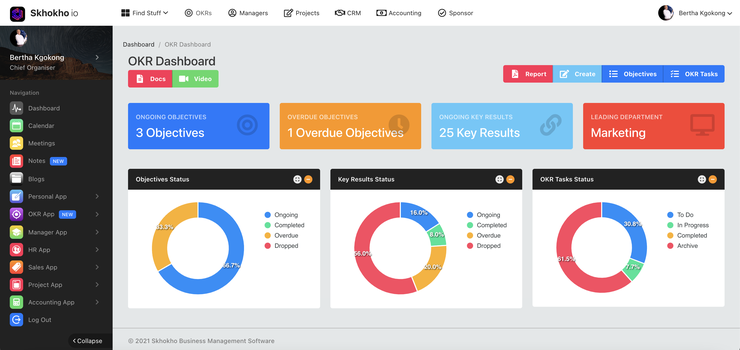How to set your OKRs and stick to them
There is a lot of hype around these days about OKRs. If you aren't familiar with OKRs they are a method to create goals and help you achieve them. They are often used in businesses to help employees set these goals and better achieve their objectives. There is also a lot of focus on how to define these OKRs, use OKRs, but not a lot on how to stick to them. This blog will look at goal setting and help you stick to them.

We will focus on the following:
- What are Objectives and Key Results?
- Are OKRs for teams or per person?
- What makes OKRs effective?
- Writing good business OKRs
- The best practice for setting personal OKRs in a company
- How to Stick to OKRs
What are Objectives and Key Results?
Objectives and key results are one of the most common ways for companies or managers to create and manage team or personal goals. It's a great, simple way to get everyone in a team working together, communicating and bringing productivity. Setting these objectives for your team also helps them with personal development and attaining skills. What's more, they can be team-based or personal okrs. You can change or adapt OKRs with ease. Yet many companies struggle to define their OKRs or to stick to them.

Are OKRs for Teams or for Individuals?
Are OKRs for teams or personal? it depends on what's best for your company success and your employees. If you have small teams, it might make more sense to have team-based OKRs. This way, everyone is working together towards common mission and enhance team performance.
However, if you have large teams or if your employees are working on different projects, it might make more sense to have personal OKRs. This way, each person is responsible for their own personal mission and can work at their own pace also align tasks for each personal okr. Working on their own is important for growth and personal development. Ultimately, it's up to you to decide what will work best for your company.
What makes OKRs effective?
Some factors that can make OKRs effective are having a clear and attainable goal, setting a timeframe, involving all members of the team, monitoring progress and performance. Having a goal that is specific, measurable, achievable, relevant, and time-bound can help to make it more effective.

Setting a timeframe for the objective to be accomplished can add a sense of urgency and keep everyone on track. Involving all members of the team in the process can help to ensure that everyone is invested in achieving the goal. Lastly, monitoring progress along the way can help to identify any areas that need improvement.
There are a few key things that make OKRs effective.
- First, they need to be clear and concise. This means that everyone involved needs to understand what the goal is and what their part is in achieving it.
- Secondly, they need to be achievable. This means that they should be challenging but not impossible to reach.
- Lastly, they need to be relevant. This means that they should be aligned with the company's overall strategy and be something that everyone is working towards.
When done correctly, OKRs can be an effective way to measure and monitor progress maybe per week. Monitoring progress along the way can help to identify any areas that need improvement.
How do you Write Good Business OKRs?
OKR personal value adds value if they are based on a company OKR for the individual worker. The management can also track employee performance. Writing an excellent OKR will take some hours to prepare and be careful. This list aims at helping people develop their own personal OKR:

Once the management decided whether they want team-based or individual OKRs, it's time to start setting them. First, you'll need to identify your company's overall goals. What are you hoping to achieve in the next year? Once you have a goal in mind, you can focus on your goal setting. Objectives are specific, measurable goals that you want to achieve, and key results are the metric you'll use to measure whether or not you've achieved your objective. For example, if your goal is to increase sales, your objective might be to increase sales by 10% and your key result might be the number of sales made per week.
Once you've set your OKRs, it's important to stick to them. This means setting a deadline for each objective and key result and holding yourself and your team accountable to meeting those deadlines. It can also be helpful to monitor your progress per week and revise as needed, maybe every day, every week or end of the quarter. If you find that you're not meeting your targets, you may need to adjust your objectives or key results.
OKRs can be a great way to set and track progress towards your objective. However, it's important to choose the right type of OKRs for your company and to stick to them in order to see results.
Consider WHY you want to achieve each Key Result
The definition of the key results is crucial in determining what the goal is. Setting unrealistic examples can make your failure a disaster. You can write this reason into your OKR sheet which will be easier for motivation when you hit the slump. It's important to set yourself some clear and achievable tasks, but it's just as important to consider WHY you want to achieve each one. OKRs can be a helpful way to structure and focus your goals, and make sure you're considering the bigger picture.

Think about what you hope to accomplish with each key result. What difference will it make to your company or project? How will it contribute to your overall objectives? Keeping your goals aligned with your overall mission will help you stay motivated and on track. It can also be helpful to involve other people in setting and reviewing your OKRs. Ask for feedback from your team or colleagues, and get them involved in brainstorming and setting goals. This will help to ensure that your goals are realistic and achievable, and that everyone is on the same page.
When you're figuring out your OKRs, it's important to take a step back and consider WHY you want to achieve each key results. What is your ultimate goal? What will hitting these key results allow you to do? Answering these questions will help you to better understand your priorities and how to best allocate your resources in order to achieve your desired results. It will also help to keep you motivated when things get tough and can't focus - remembering WHY you're doing something is a powerful way to stay focused on your goals.
What is the Best Practice for Setting Personal OKRs in a Company?
All employees should be synchronised with departments and companies in order for everyone to achieve a common goal and aims. Firstly it helps set company OKRRs to leadership levels and then set departmental and individual OKRs to support company objectives and key outcomes.

The best practice for setting personal OKRs will vary depending on the company and the individual's role within it. However, there are some general guidelines that can be followed to ensure that personal OKRs are set effectively and achieved. Firstly, it is important to ensure that personal OKRs are aligned with the company's overall strategy and objectives. This will ensure that individuals are working towards the same goals and that their efforts are contributing to the company's success.
Secondly, personal OKRs should be realistic and achievable. This means setting goals that are challenging but not impossible to reach, and which will stretch the individual without putting them under too much pressure.
Finally, you don't need a lot of resources, it is important to set OKRs using the best OKR software:
Best OKR Software
Skhokho OKRs
Skhokho aims to make it easy for businesses to set, track and achieve their OKRs. Skhokho's OKR functionality is fully integrated with the rest of the platform, so businesses can see how their OKRs fit in with the rest of their operations. Skhokho's OKR management system includes a range of features to help businesses stay on track, including:

- Objectives and key results: Set and track your OKRs in Skhokho, and see how they contribute to your overall company goals. Break down your objective into smaller achievable and measurable tasks.
- Reports and analytics: Monitor your progress against your OKRs, and generate reports to share with your team or stakeholders.
- Action items: Stay on track with your OKRs by assigning action items to team members or yourself.
- Best practice advice: Get advice on setting and achieving your OKRs from Skhokho's team of OKR experts.
Skhokho business software's OKR application is a great tool for recording and monitoring objectives. You can use it to set your OKRs and stick to them. Here's how:
- Enter your objective into the application.
- Create a key result for your objective.
- Create a deadline for your key result.
- Monitor your progress on the key result.
- Make adjustments to your key result as necessary.
- Repeat steps 2-5 for each of your objectives.
- Review your OKRs periodically to ensure you are on point.
Using the OKR application from Skhokho business software is a great way to stay focused on your objectives and ensure you are making progress towards your goals. Give it a try today!
How to Stick to OKRs
Here are a few general tips that may help you to stay on a right path:

- Put realistic and achievable goals. It is important to define goals that you can actually accomplish within the timeframe that you have set. Otherwise, you will only end up feeling frustrated and discouraged.
- Make a plan. Once you have your goals set, you need to make a plan for how you are going to achieve them. This should include actionable steps that you can take on a regular basis.
- Stay accountable. One way to do this is to keep a progress journal or share your goals with a friend or family member to help keep you accountable as agreed upon.
- Take it one day at a time. Don’t try to do too much all at once or you will quickly become overwhelmed. Rather, focus on taking small steps each day to help you reach your eventual goal.
Summary
One of the biggest benefits of implementing OKRs is that you develop a concrete way to track progress and stay motivated. If you're trying to use OKRs and you're having trouble with this, then you've come to the right place. Try your Skhokho OKRs free trial today! https://skhokho.io/authentication/register









